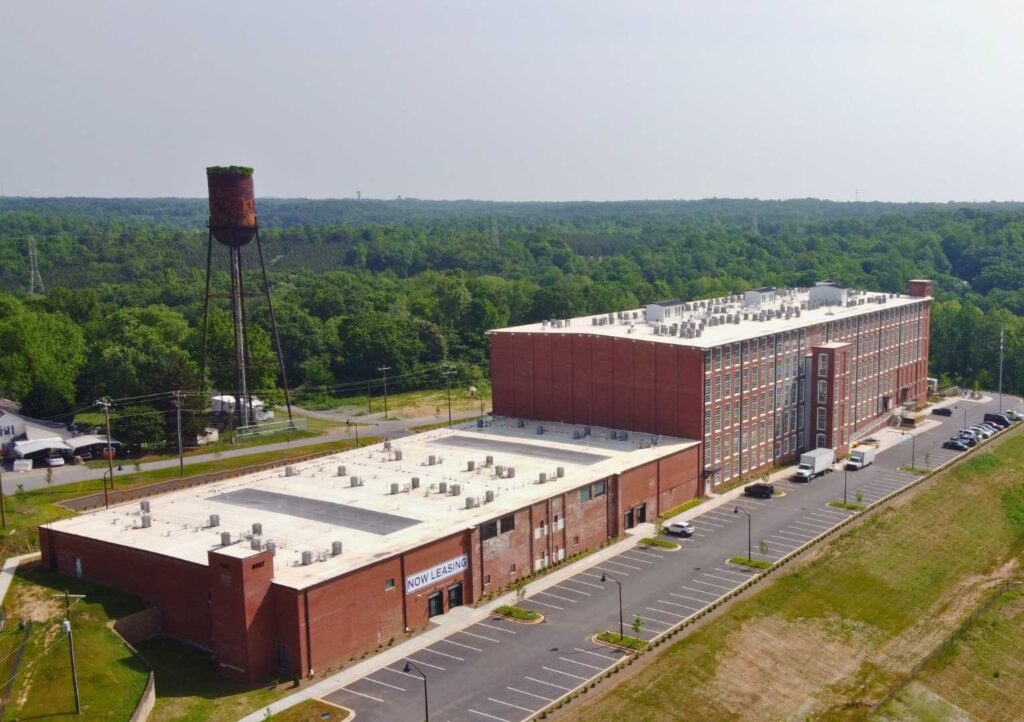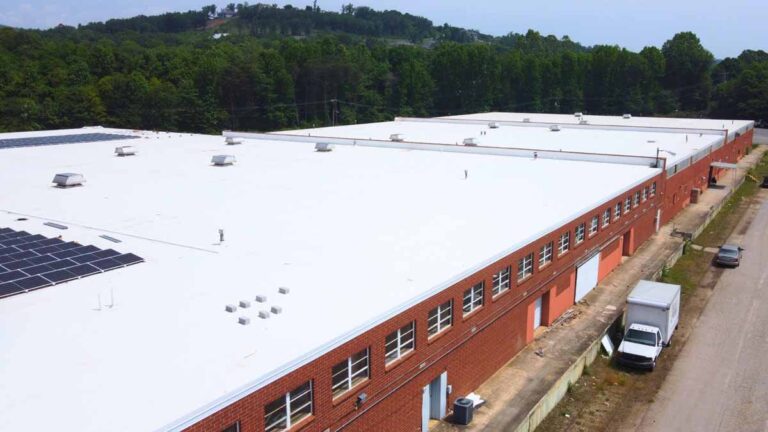TPO
Roofing System
TPO, thermoplastic Polyolefin, is one of the fastest-growing single-ply commercial roofing systems on the market and makes up roughly 40% of the commercial roofing market share according to the National Roofing Contractors Association (NRCA). Single ply membrane TPO provides a lower cost, higher-performing membrane which is made from a single layer of synthetics that is reinforced by a scrim layer, and is popular on low slope/ flat commercial roofs. The membrane roofing material comes in a variety of widths ranging from 10, 12 and 20 feet wide and ranges in thickness of 45 mil TPO, 60 mil TPO, and 75 mil TPO. TPO provides long term coverage especially for large square foot roofs.
The effectiveness of a TPO membrane depends on the quality of installation from your commercial roofing contractor.
TPO Roofing Installation:
Prior to installation, a layer of coverboard and insulation will be attached to the roof deck to provide a vapor barrier between the deck and the membrane itself. The insulation options include:
Polyisocyanurate (Polyiso) – Commonly used Polyiso insulation ranges in thicknesses to provide the ideal R-value for your application.
Expanded Polystyrene (EPS) – EPS provides the highest R-value per dollar and will not retain water over time.
Extruded Polystyrene (XPS) – EXP normally falls between Polyiso and EPS in terms of performance and price. It is semipermeable with a perm rating of 1.
Fully Adhered TPO System-
Fully adhered TPO systems bond the membrane to the deck’s substrate utilizing specific TPO bonding adhesive. The surface is first cleaned, dried and freed of oil, grease and other foreign materials. A fully adhered system requires installation at 40 degrees and rising and the membrane should be at 60 degrees prior to installation.
Pros of Fully Adhered: TPO membrane acts as an air barrier with no space between the substrate and membrane. This makes for a more energy-efficient solution.
Mechanically Attached TPO System-
A mechanically attached TPO membrane uses fasteners to attach the membrane through the insulation and into the structure’s deck (12” on center) along every seam of the membrane. Each seam is then welded using a hot air welder that heats the membrane above and below, turning it to plastic and making it moldable. Unlike a fully adhered membrane, an attached system will allow air between the membrane and the substrate which is less energy efficient and reduce the R-factor of the insulation as a result of billowing of the membrane. Billowing can also create stress on the seams and general more stress on the roof system itself.
Pros of Mechanically Attached TPO: Can be installed at any temperature. Mechanically fastened TPO and is a lower cost application vs an Adhered membrane.
Best Uses For TPO:
In terms of energy efficiency, a TPO membrane performs better in warmer climates, Zones 1, 2, and 3. Most often, the decision to use a TPO Membrane system stems from the cost savings over other systems. Although it has UV protective qualities, it will not hold up to extreme heat as compared to an EPDM. Therefore, when using this system on flat roofs, a tapered insulation should be installed to avoid ponding and push water toward the drainage systems to avoid reroof or a TPO repair. A licensed TPO roofing company will ensure this is done correctly and last long term. A TPO Contractor should be contacted for TPO repairs to insure proper service and maintenance.
ReQuest Roof Quote
Safe, Smart, and Professional Service for Your Next Roofing Project.
In Summary
The following characteristics of a TPO membrane include:
- Economical energy savings
- Provide a cooling factor to buildings located in warmer regions
- Durable relative to the costs
- Lightweight and ease of installation
Warranties:
All our TPO roof installations come with a 20-year manufacturer’s warranty that stands behind the integrity of the product. WNC Roofing utilizes both Firestone and Carlisle 60 mil TPO membranes and adheres to the manufacturer’s installation requirements to maintain the 20-year warranty for all roofs we install.
A post-installation inspection is conducted by the manufacturer following each of WNC Roofing’s projects before final sign-off for the 20-year warranty is approved. Additionally, WNC Roofing provides a two-year workmanship warranty to cover all installation aspects.

